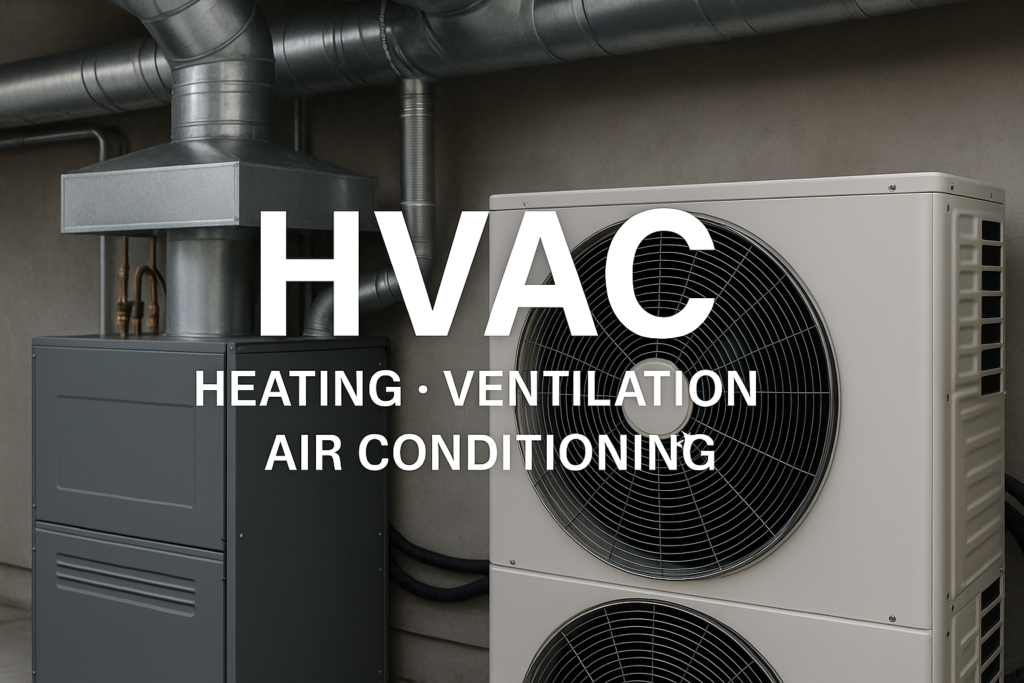
When you hear the term HVAC, you might think of air conditioners or heaters. But HVAC meaning goes beyond just hot and cold air. HVAC stands for Heating, Ventilation, and Air Conditioning—a system that controls the climate inside homes, offices, and buildings. In this article, we’ll break down what HVAC really means, its major components, and why understanding this system is crucial for comfort, energy efficiency, and air quality.
What Does HVAC Mean?
HVAC Definition
The HVAC meaning refers to the technology used to regulate indoor temperature, airflow, and air quality. It combines three primary functions:
- Heating: Systems like furnaces or heat pumps warm indoor spaces.
- Ventilation: Air is exchanged or circulated to remove moisture, odors, smoke, heat, dust, and airborne bacteria.
- Air Conditioning: Cooling systems that reduce heat and humidity in indoor environments.
In short, HVAC means the complete control of indoor environments for human comfort and safety.
Components of an HVAC System
Understanding the parts of an HVAC system can help you maintain it more effectively. Here’s a breakdown of the major elements:
1. Heating Units
Common types include:
- Furnaces: Use gas, oil, or electricity to produce heat.
- Heat Pumps: Transfer heat from the outside air or ground.
2. Ventilation Systems
These include:
- Ductwork: Carries air throughout a building.
- Exhaust systems: Remove stale indoor air.
- Air filters: Trap particles and improve air purity.
3. Air Conditioning Units
Key systems include:
- Central Air Conditioners
- Split Systems
- Ductless Mini-Splits
Each plays a role in managing temperature and humidity efficiently.
How HVAC Systems Work Together
While heating, ventilation, and cooling can exist as separate units, in modern HVAC systems, they often work together as a centralized system. For example, a thermostat signals the HVAC unit when the temperature drops or rises, triggering the heating or cooling system as needed. Ventilation ensures the air is fresh and clean, circulating it continuously.
Importance of Understanding HVAC
Understanding HVAC meaning and definition benefits homeowners, business owners, and anyone responsible for building maintenance:
- Energy Efficiency: Properly managed systems can reduce utility bills.
- Air Quality: Prevents mold, dust, and allergens.
- Comfort: Maintains optimal indoor temperature and humidity levels.
- Longevity: Informed users can better maintain their systems.
The U.S. Department of Energy offers guidance on HVAC efficiency standards and tips for homeowners looking to save energy.
Common HVAC Terminology
To fully understand what HVAC means, familiarize yourself with these related terms:
| Term | Meaning |
|---|---|
| SEER | Seasonal Energy Efficiency Ratio (for air conditioners) |
| BTU | British Thermal Unit—measures heat energy |
| Thermostat | Controls HVAC settings |
| Air Handler | Circulates air inside the building |
| Zoning System | Allows independent temperature control in different areas |
Future of HVAC: Smart and Sustainable
Modern HVAC systems are becoming more eco-friendly and smart. Features like smart thermostats, remote monitoring, and variable-speed compressors allow for greater control and less energy consumption. Many systems now also include air purifiers to further improve indoor air quality.
Conclusion
The HVAC meaning goes beyond simple temperature control. It represents a system that ensures healthy, comfortable, and energy-efficient indoor environments. By understanding what HVAC means and how its components work together, you’re better equipped to maintain your system and make smart choices when upgrading or replacing equipment.



